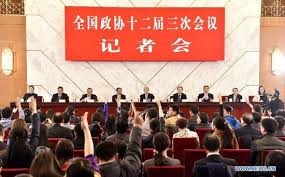Delegates from the Inner Mongolia and Xinjiang Uyghur autonomous regions veered away from press conference conventions during the annual two sessions, showing an inspiring change to the perception that Chinese officials are reluctant to speak before the media.
Wang Jun, Inner Mongolia's party chief, called for an impromptu press conference after a group discussion with the rest of the region's delegation on Tuesday morning. The on-the-spot conference was participated by media representatives and several Inner Mongolia city mayors.
Wang explained that the press conference was an avenue for the reporters to ask deeper questions that were remained unanswered. Prior to the conference, an open-door session was already held.
The impromptu conference ignited outspoken responses to tough questions raised by the members of the media. The inquiries revolved around the Tengger Desert pollution issue and the wrongful execution of an 18-year-old accused of rape and murder in 1996.
On the same day, Xinjiang party chief Zhang Chunxian fiercely answered all three sensitive questions about violence and corruption asked by a Hong Kong-based reporter in an open-door session. Normally, a reporter is only allowed to ask one question.
The party chiefs' moves were regarded by industry experts as a breakaway from the usual media inquiry landscape during the annually held two sessions.
For a number of years now, comments that the press conferences during this meeting are staged and scripted are constantly uttered. Many believe that the people have the right to know what are the things being discussed during the sessions, citing transparency to media as one way to connect the delegates with the public.



























